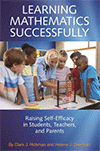
Learning Mathematics Successfully
Raising Self-Efficacy in Students, Teachers and Parents
By:
Clark J Hickman
Helene J. Sherman
Published 2019
The goal of this book is to bring together the concept of self-efficacy theory with practical how-to strategies for both teachers and parents to use in heightening their students’ levels of self-efficacy. The book examines how self-efficacy theory relates to the acquisition of mathematical competence. The text also provides specific and practical how-to strategies for both teachers and parents in applying these principles to classroom mathematics instruction and activities. The self-efficacy practices and applications to mathematics are also suitable for families working with learners outside the school environment.
Acquiring mathematical skills requires more than knowing arithmetic tables, memorizing rules, and knowing proofs. It requires a basic belief that one is capable of obtaining this information, making sense of it, and applying and generalizing it in mathematical problems. In addition, a student must believe that obtaining these skills leads to a positive outcome, whether it is perceived to be a good or passing grade, comfort-level in tackling mathematical problems, being able to advance to the next mathematics course, being able to score highly on the math section of the SAT and/or be competitive for a desired job.
The ability of students to achieve and exceed grade level competence in mathematics is addressed through the lens of Albert Bandura’s Self-Efficacy Theory. This theoretical position states that one will persist in mastering a behavior (in this case, mastering mathematical principles and skills), in the face of obstacles or failures—to the extent that one believes he or she has the ability to do so, and that there is a desired outcome for doing so. The research literature on the role of self-efficacy in mathematic instruction is examined to demonstrate the validity of using this concept to increase student (and parent/teacher) confidence in learning and applying grade-appropriate math content. Specific teaching methodologies will be provided that infuse self-efficacy strategies for students. Lastly, teachers and parents are provided strategies to increase their own self-efficacy when it comes to conveying mathematics principles to their child or student, as well as strategies to assess their students’ level of self-efficacy over time.
Teaching and learning mathematics so that students achieve success at their grade level or above can present a variety of challenges. One barrier that affects learners is the belief that one is not capable of learning mathematics or not naturally talented in the field, not a “math person.” As a result, learners may not believe they are capable of a positive outcome for achieving mathematics success. This book is an important resource for pre-service and in-service teachers, as well as families in applying the theory of self-efficacy to support learners in becoming confident and assured in their ability to understand and apply mathematical principles and procedures. Coupled with classroom ready mathematics instructional strategies, the book provides readers with the background, tools and strategies needed to carry content success and confidence forward to remain persistent in solving all future mathematical problems.
CONTENTS
Acknowledgements. CHAPTER 1: Foundations of Social Learning Theory and Self-Efficacy: Teaching, Learning, and Mentoring. CHAPTER 2: Self-Efficacy and Student Learning. CHAPTER 3: Mathematical Self-Efficacy and the Student. CHAPTER 4: Attending to Professionalism: Addressing the Teacher’s Own Self-Efficacy to Teaching Mathematics. CHAPTER 5: Parents’ Role in Fostering Mathematical Self-Efficacy: Parents and Teachers Working Together. CHAPTER 6: Using Self-Efficacy in Mathematics Games and Activities. CHAPTER 7: Pulling It All Together: Self-Efficacy in Math, Lifelong Learning, and the Importance of Parents and Teachers in Shaping Student-Confidence. Appendix A: Teacher Self-Efficacy Scale. Appendix B: Parental Self-Efficacy Scale. Appendix C: Game Board Templates. Appendix D: Mathematical Games/Activities Websites. About the Author.
-
Paperback9781641137379
Web price: $45.04 (Reg. 52.99)
-
Hardcover9781641137386
Web price: $80.74 (Reg. 94.99)
- eBook9781641137393

- EDU029010 - EDUCATION: TEACHING METHODS & MATERIALS: Mathematics
- EDU051000 - EDUCATION: Learning Styles
- EDU022000 - EDUCATION: Parent Participation
-
 A Practical Guide to Exemplary Professional Development Schools
A Practical Guide to Exemplary Professional Development Schools
-
 Catalytic Improvement Communities
Cultivating Flourishing Schools
Catalytic Improvement Communities
Cultivating Flourishing Schools
-
 Diversity as Strategic Opportunity
Exploring New Paths to Good Administration
Diversity as Strategic Opportunity
Exploring New Paths to Good Administration
-
 Narratives of TESOL Professionals
Experiences Navigating the Doctoral Program
Narratives of TESOL Professionals
Experiences Navigating the Doctoral Program
-
 Taking eService-Learning to the Next Level
Models and Tools for Next Generation Implementation
Taking eService-Learning to the Next Level
Models and Tools for Next Generation Implementation
-
 The AMTE Handbook of Mathematics Teacher Education
Reflection on Past, Present and Future – Paving the Way for the Future of Mathematics Teacher Education, Volume 5
The AMTE Handbook of Mathematics Teacher Education
Reflection on Past, Present and Future – Paving the Way for the Future of Mathematics Teacher Education, Volume 5
-
 The Undivided Life
Faculty of Color Bringing Our Whole Selves to the Academy
The Undivided Life
Faculty of Color Bringing Our Whole Selves to the Academy

